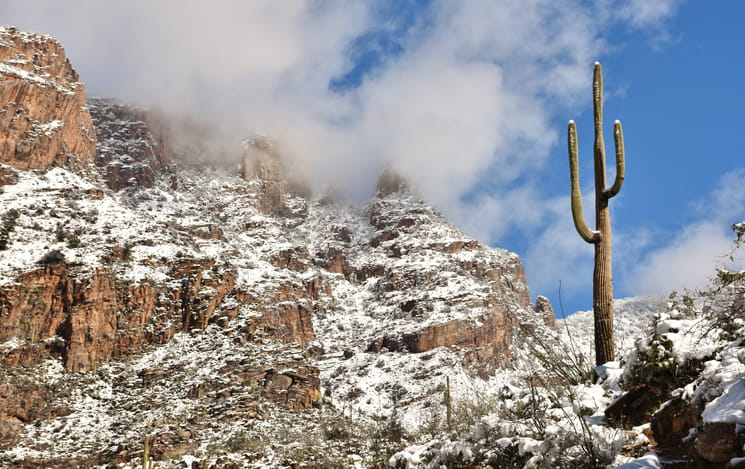Dry winter climates in the desert make it harder for seniors to live comfortably. Wheezing, coughing, joint pain, and a number of other health issues always increase during this time.

Any health issue is more serious as you get older, so preparing yourself against the harsh winter weather is your best defense.
Armed with the right senior health tips in Arizona, you’ll battle winter weather and stay just as healthy during the colder months as you were the entire rest of the year.
What Are Some Common Health Risks for Seniors During Desert Winters?
Dehydration is the primary concern for seniors during desert winters because the dry air may lead to more fluid loss. There isn’t enough moisture in the air to help your body stay hydrated, so loss of water is more common.
This can also affect your respiratory system, leading to breathing difficulties. Without enough fluids in your lungs to help them work properly, they’ll have a harder time feeling normal.
If you’re having any problems or need more help preparing for the winter, contact Haven Health nursing facility to get more information.
How Can Seniors Stay Hydrated in Dry Winter Conditions?
The best and easiest way to stay hydrated in dry winter conditions is by drinking plenty of water throughout the day. You can also add fruits and vegetables that have a high water content.
Keep a humidifier in the home to add moisture back into the air so you don’t dry up from the arid climate. Having some lotion on a nearby side table is always a good option so you can keep your entire body moisturized and prevent wounds from dry skin.
Related: Managing Chronic Conditions in Seasonal Weather for Seniors
What Types of Clothing Are Best Suited for Seniors in Desert Winters?
The best type of clothing for desert winters is loose-fitting, lightweight fabrics that still provide protection from extreme environments.
Here are some things to keep in mind when looking for the best clothing options:
- Merino wool: This fabric is just like wool but lightweight and regulates temperatures better
- Lightweight fabrics: You need clothing that allows for plenty of ventilation and air circulation
- Moisture wicking: Chances of rain or snow will be higher, so you’ll want moisture-resistant materials that don’t get soaked
- Layers: Wear several layers, so you can always remove and add clothing as needed like scarves and jackets
How Can Seniors Maintain Their Skin Health in Arid Winter Climates?
Hydration is key, so drinking plenty of water is essential to keep your skin moisturized from within. You’ll also want some portable and at-home lotion bottles around.
Choosing a gentle cleanser and moisturizer for your morning or night routine can help prevent dryness and irritation. Make sure the products are for sensitive skin.
Maintaining skin health in the winter can be a full-time job. Haven Health’s assisted living facility makes it easy to stay healthy throughout the entire year.
What Indoor Activities Can Seniors Engage in To Stay Active During Desert Winters?
The colder weather makes it harder to get outside and enjoy a nice walk or sit on a bench outside, but you can still stay active with easy indoor activities.
Here are five fun choices anyone can do:
- Chair yoga sessions for gentle stretching and relaxation
- Indoor gardening to nurture plants and enjoy greenery
- Watercolor painting for creative expression and mindfulness
- Tai Chi for balance, flexibility, and stress relief
- Puzzle solving to keep the mind sharp and focused
Staying active during desert winters can fight off those winter blues and keep you healthy throughout the year. Our skilled nursing facility has plenty of indoor activities that seniors can enjoy during the winter.
What Dietary Adjustments Should Seniors Consider for Desert Winters?
You don’t have to switch up your entire diet when winter comes in the desert, but you should consider making a few small changes that can make a big difference.
Start by keeping track of your water consumption. It could be beneficial to add some electrolytes to the water for maximum rehydration, but you’ll want to consult with your doctor.
For proper elderly care in Arizona where you don’t have to worry about dietary adjustments, Haven Health will monitor dietary needs, so you can enjoy your winter.
How Can Seniors Ensure They Get Enough Vitamin D During Winter?
Winter means cloudy, cold days, and you’ll need to make sure you’re getting enough vitamin D during that time. Vitamin D is your main defense against falls, since it fights off muscle pain and muscle weakness.
Here are some foods that will help you get your full serving each day:
- Fatty fish like salmon
- Egg yolks
- Mushrooms
- Fortified food (milk, orange juice)
You can also sit by your window during the sunniest parts of the day to get even a little sunshine.
Related: Understanding Seasonal Affective Disorder in Seniors
What Are Some Effective Ways for Seniors To Manage Respiratory Issues in Dry Climates?
In dry climates, you can manage your respiratory issues by wearing a scarf when you go outside to warm up the air before it hits your lungs. This can provide some more moisture to prevent dry coughs.
Take warm showers instead of really hot ones because the steam can actually cause too much moisture in the air and make it hard to breathe.
If you need better long-term care in Arizona, Haven Health’s nursing facility has an excellent staff dedicated to giving every senior a better quality of life.